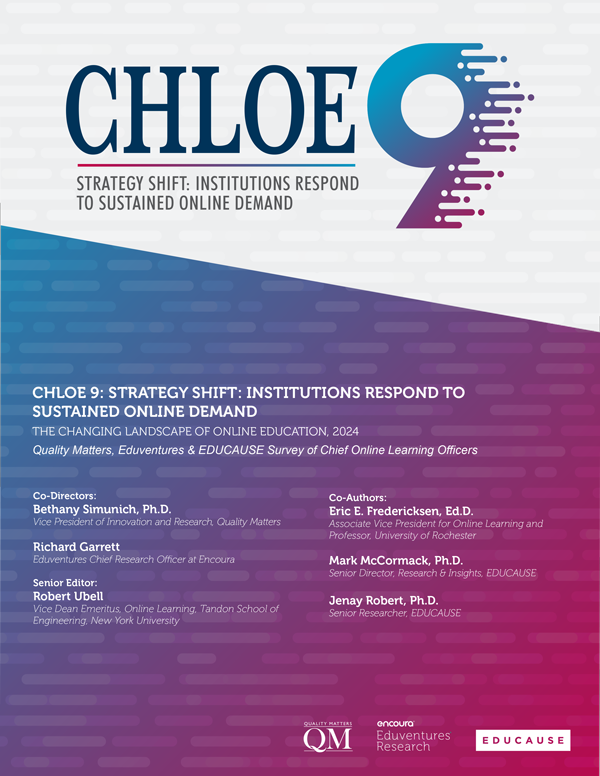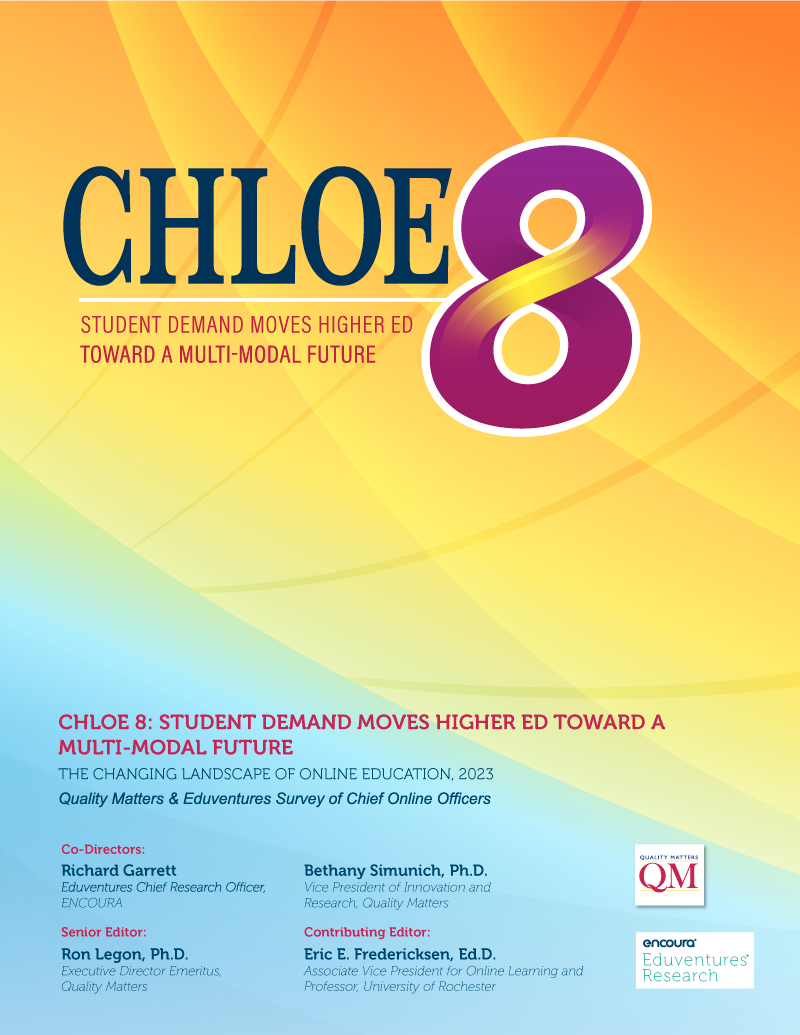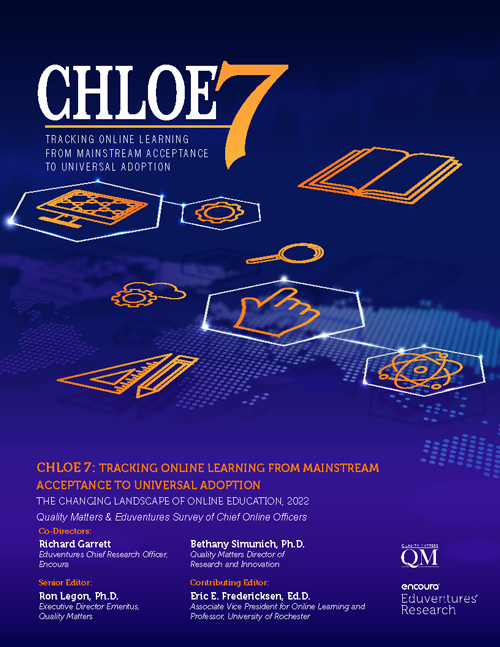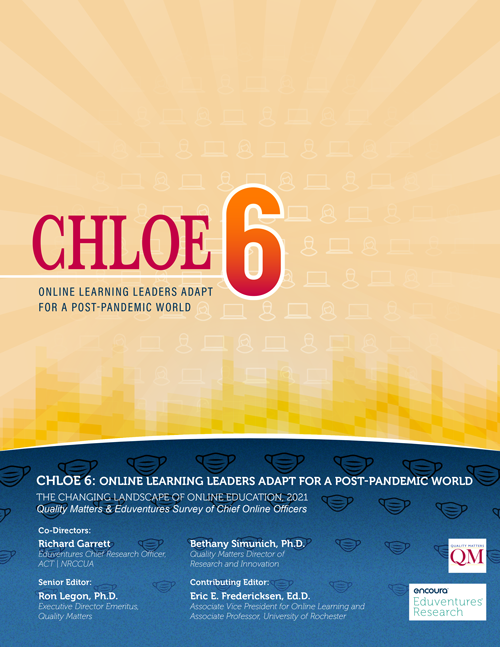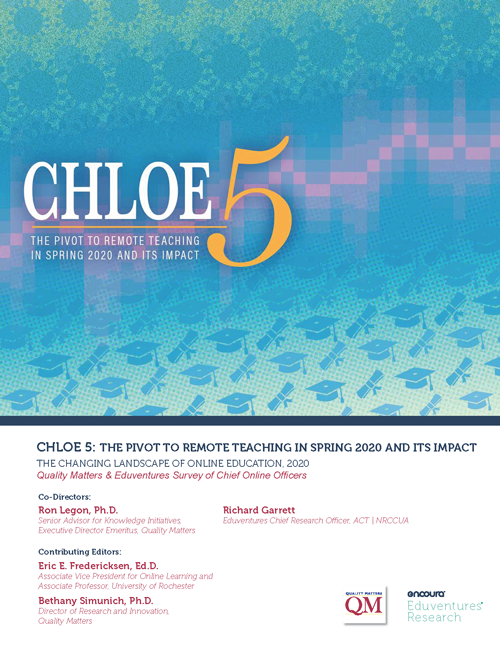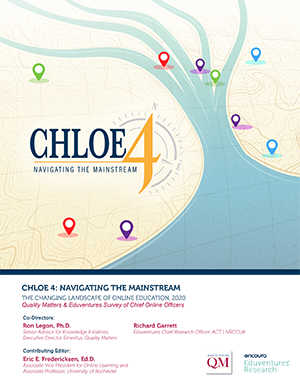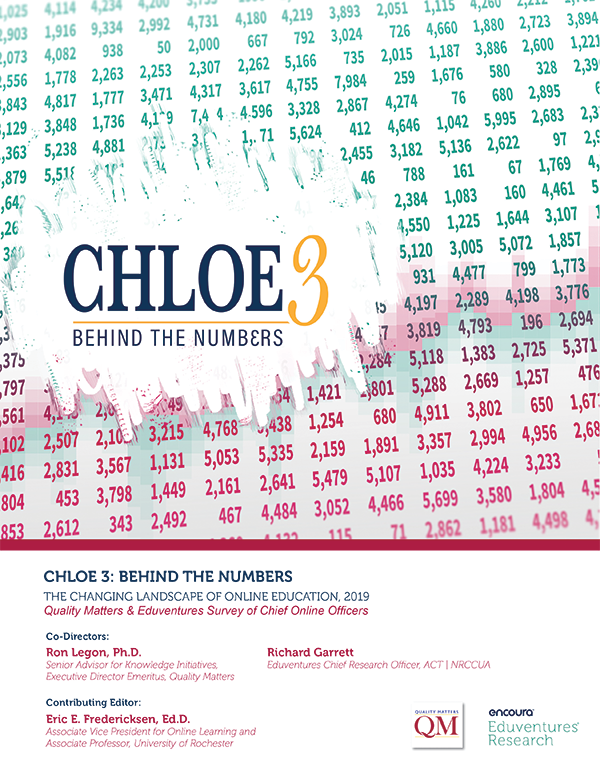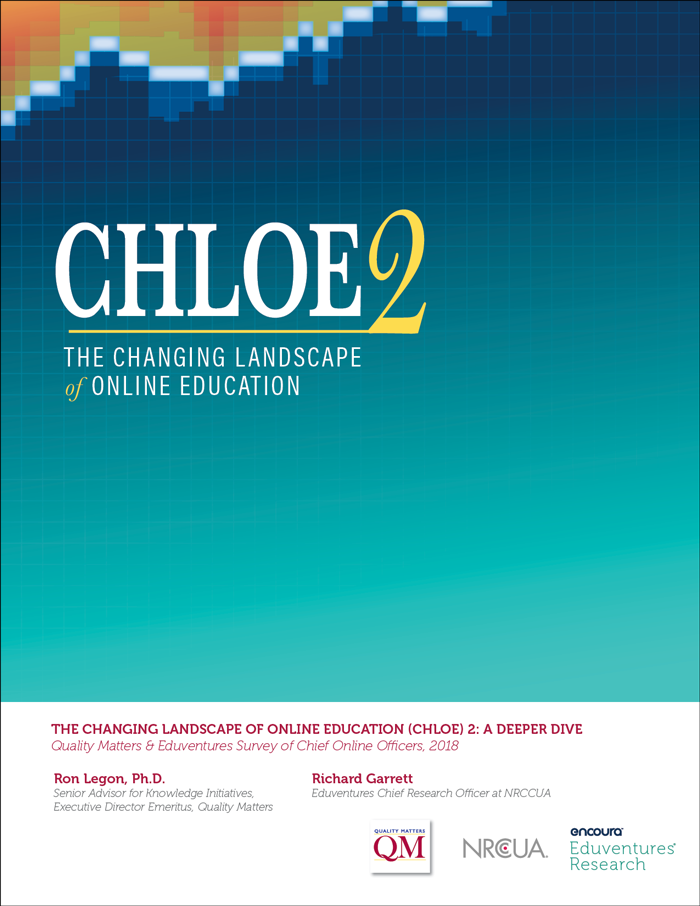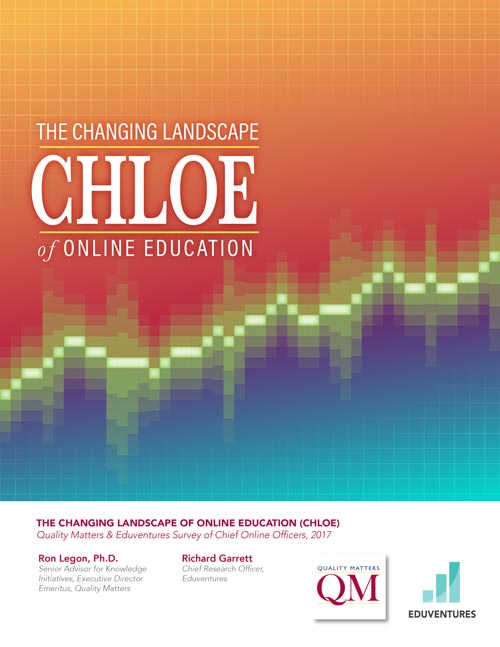CHLOE Presentations
Learn more about the most recent CHLOE Report at one of many public presentations.
The CHLOE project looks at the structure and organization of postsecondary online education in the U.S., as it becomes increasingly mainstream. As online learning moves from an experimental phase to an established institutional function, CHLOE documents steps to achieve stability, reliability, and consistency.
Survey Pool
In contrast to other surveys, CHLOE seeks the insight and perspective of the senior online officer at each participating institution in the belief that this individual has a unique vantage point from which to assess online learning at their institution.
QM's Collaboration with Eduventures and EDUCAUSE
In 2016, Eduventures Research and Quality Matters formed a partnership to fill a gap in the research related to online education by focusing on how it is being carried out at postsecondary institutions across the United States. The first CHLOE Survey was conducted in 2016 and resulted In the 2017 CHLOE 1 Report. In 2023, EDUCAUSE joined Eduventures Research and QM to work on the CHLOE Project, beginning with CHLOE 9.
Upcoming Surveys
CHLOE 10 will continue to measure the way online learning reshapes the face of higher education in the future by surveying those managing this shift.
Participate in CHLOE Surveys >>
The Reports
CHLOE 9 | Strategy Shift: Institutions Respond to Sustained Online Demand
Student demand for online and hybrid learning continues to grow, and institutions are working hard to find their footing in this post-pandemic environment. The deeper story is that institutions are reexamining their identities and priorities in light of this increased multi-modal demand.
Major takeaways from the ninth survey of U.S. chief online learning officers on how their two- and four-year schools are managing online learning include:
- The preference for online modalities among U.S. learners continues to surge. Nearly half of COLOs surveyed indicated that enrollment in online degree programs at their institutions is now higher than that of on-campus programs.
- More than half (56%) of COLOs indicated that their institutions have undergone a strategic shift in response to this demand. As overall enrollment continues to lag behind the post-pandemic years, this opportunity to reach more learners may be pivotal for institutional financial sustainability.
- COLOs reported a wide variety of approaches for addressing the presence of artificial intelligence at their institutions. 35% of COLOs reported having AI-related policies; 32% of COLOs say that AI as a topic is taught to students; only 6% of COLOs said students are actively discouraged from using AI.
CHLOE 8: Student Demand Moves Higher Ed Toward a Multi-Modal Future
Student demand for online and hybrid learning continues to grow, and institutions are working hard to find their footing in this post-pandemic environment. The deeper story is that institutions are reexamining their identities and priorities in light of this increased multi-modal demand.
Major takeaways from the eighth survey of U.S. chief online officers on how their two- and four-year schools are managing online learning include:
- A majority of respondents report stagnant or declining enrollment among traditional undergraduates in face-to-face programs, and an even greater percentage say that the number of adult undergraduates and graduate students in these programs is declining.
- Chief online officers report strong growth for fully online programs (36%) or hybrid programs (20%), and a greater percentage say adult undergraduate and graduate online and hybrid programs are growing.
- Approximately half the respondents confirm that their present strategic plans and resource allocations support a greater emphasis on online learning and multi-modal study. An additional 36% indicate their institutions are reconsidering strategic priorities in light of student demand.
CHLOE 7: Tracking Online Learning From Mainstream Acceptance to Universal Adoption
In the next few years, online learning will become a part of nearly every higher ed student’s experience. That’s one takeaway from the CHLOE 7 report, a joint project of Quality MattersTM and Eduventures® that offers an overview of the online learning landscape at higher education institutions. The report draws on survey responses from chief online officers at two- and four-year colleges and universities, who are uniquely situated to assess the current state of online education.
Significant takeaways from the in-depth report include:
- A large majority of respondents predict that by 2025 most higher education learner experiences will include online learning.
- Institutions can and should adjust their strategies and allocate more resources to online learning in response to student needs.
- While quality assurance standards for online courses are in place, review processes for ensuring standards are met are lagging.
2021 CHLOE 6: Online Learning Leaders Adapt for a Post-Pandemic World
The COVID pandemic constituted a stress test on how online learning could respond to an externally driven emergency requiring its rapid expansion and how such an experience, encompassing the entirety of higher education, might change its scope, image and future direction. CHLOE 6 establishes that the pivot to remote learning increased the reach and accelerated the adoption of online learning, and increased the influence of chief online officers.
- All sectors of higher education invested in ed tech in 2020 and 2021, amounting to the biggest investment jump ever. This included largely in-person schools that had not previously made significant investments in online learning-related technologies.
- Two-thirds of surveyed institutions relied on their chief online officer to coordinate their institution’s response to the COVID-19 pandemic, including course conversion, faculty training, student preparedness, technology capability, and quality assurance.
- When asked about future online undergraduate enrollment, only 13% of Chief Online Officers (COOs) expected the moderate growth seen in pre-pandemic years, while 77% predicted some or major acceleration in this trend.
Report authors conclude that institutions would be well-advised to capitalize on the momentum or positivity generated by the pandemic’s forced shift into fully-distanced learning.
2020 CHLOE 5: The Pivot to Remote Teaching in Spring 2020 and Its Impact
CHLOE 5 is a departure from the previous four surveys and reports in its focus on a single issue — the impact of higher education's response to the COVID-19 pandemic and the impact it is having on the short- and long-term prospects of online learning.
In CHLOE 5, Chief Online Officers:
- Identify the key challenges their institutions had to overcome during their pivot to remote instruction in spring 2020
- Acknowledge the specific challenges involved in the pivot, while concluding the pivot was largely successful from the institutional, student, and faculty perspectives
- Specify their priorities for quality improvement to remote instruction to get closer to true online learning should expanded online learning continue into fall 2020 and beyond
A notable conclusion from CHLOE 5 is that although colleges may be announcing a return to the in-person classroom in the fall, their online officers are preparing for a term of improved remote study.
2020 CHLOE 4: Navigating the Mainstream
The number of participants in CHLOE continued to grow in this fourth year, up 31% from participation in CHLOE 3. Respondents to CHLOE 4 included 20 of the 60 Flagship schools in the U.S. (33%). Some surprising contrasts with other sectors emerge from a first look at Flagship institutions.
CHLOE 4 added a sixth type to the list of models used to categorize the way institutions manage online education: Flagship - The leading 4-year public universities, with research and public service roles, as designed by their home states and recognized by the Association of American Universities, with fewer than 7,500 fully and partly online students.
CHLOE 4 continued coverage from the earlier CHLOE surveys and found, for example, that use of OPMs doubled from 12% to 24% between 2017 and 2019. It confirmed findings from the earlier reports, such as the finding that “enterprise” institutions — those that already have the largest online enrollments at more than 7,500 fully and partly online students — have the most aggressive plans for program expansion and that the course development process is largely internal, with heavy dependence on faculty and less consistent involvement of instructional designers.
CHLOE 4 dug deeper with more open-ended questions about issues such as long-term institutional goals and the relationships of chief online officers with other senior administrators. The top three goals for online education over the coming five years listed by chief online officers were improving quality, increasing enrollment and adding courses and programs.
2019 CHLOE 3 Report: Behind the Numbers
CHLOE 3 broke new ground in identifying a number of different institutional approaches to online learning, as crystalized in the descriptions of five models (Enterprise schools, Regional Public and Regional Private 4-Year schools, 4-Year schools with Low Online Enrollment, and Community Colleges). Major themes in CHLOE 3 include a more complete picture of the growth, prevalence, and scope of the Chief Online Officer position; the emergence of online committees and councils as a component of institutional shared governance; associations between online course structure, student engagement and outcomes; and the widespread neglect of coordinated blended learning.
2018 CHLOE 2 Report: A Deeper Dive
CHLOE 2 (2017) saw participation increase by 75% over the CHLOE 1 (2016) Survey. The larger sample confirmed major findings of the first survey on such mainstream issues as: widespread perceptions that online learning is a revenue generator, increasing competition, and reliance on institutional budgeting processes to meet the needs of online learning. This report delves into more detail than that of the CHLOE 1 Report with a focus on the motives behind the choices made by leaders of online programs.
2017 CHLOE 1 Report
The 2017 CHLOE Report, “The Changing Landscape of Online Education,” establishes baseline information on important trends in the management of online learning, current and emerging tools and methods in the field, regulation and accreditation challenges, and quality assurance activities. The CHLOE Survey, upon which the report is based, sets the stage for wider discussion of these issues.
